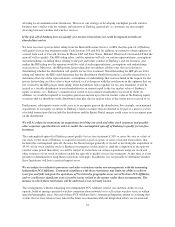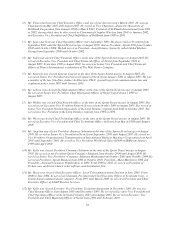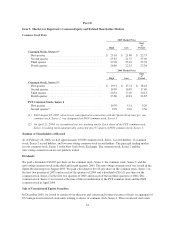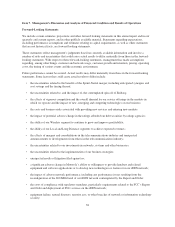Sprint - Nextel 2005 Annual Report Download - page 39
Download and view the complete annual report
Please find page 39 of the 2005 Sprint - Nextel annual report below. You can navigate through the pages in the report by either clicking on the pages listed below, or by using the keyword search tool below to find specific information within the annual report.Wireless Operations. The licensing, construction, operation, sale and interconnection arrangements of wireless
telecommunications systems are regulated by the FCC and, depending on the jurisdiction, state and local
regulatory agencies. In particular, the FCC imposes significant regulation on licensees of wireless spectrum with
respect to:
• how radio spectrum is used by licensees;
• the nature of the services that licensees may offer and how such services may be offered; and
• resolution of issues of interference between spectrum bands.
The Communications Act preempts state and local regulation of market entry by, and the rates charged by,
CMRS providers, except that states may exercise authority over such things as certain billing practices and
consumer-related issues. The California PUC has imposed rules designed to impose consumer protections.
Several other states are considering similar initiatives. These regulations could increase the costs of our wireless
operations.
The FCC grants wireless licenses for terms of generally ten years that are subject to renewal and revocation. FCC
rules require all wireless licensees to meet certain buildout requirements and substantially comply with
applicable FCC rules and policies and the Communications Act of 1934 in order to retain their licenses. Failure
to comply with FCC requirements in a given license area could result in revocation of the PCS license for that
license area. There is no guarantee that our licenses will be renewed.
The FCC has initiated a number of proceedings to evaluate its rules and policies regarding spectrum licensing
and usage. For example, it is considering new concepts that might permit unlicensed users to “share” our licensed
spectrum to the extent the FCC believes harmful interference will not occur. These new uses could adversely
impact our utilization of our licensed spectrum and our operational costs.
CMRS providers must implement E911 capabilities in accordance with FCC rules. Failure to deploy E911
service consistent with FCC requirements could subject us to significant fines. We were unable to satisfy the
requirement that 95% of our subscriber base have Assisted-GPS capable handsets by December 31, 2005. We
have filed a request for a waiver with the FCC seeking an extension of the December 31, 2005 handset
penetration deadline to December 31, 2007, on which the FCC has not yet ruled.
The FCC, together with the FAA, also regulates tower marking and lighting. In addition, tower construction is
affected by federal, state and local statutes addressing zoning, environmental protection and historic preservation.
The FCC adopted significant changes to its rules governing historic preservation review of projects, which makes
it more difficult and expensive to deploy antenna facilities. The FCC is also considering changes to its rules
regarding environmental protection as related to tower construction, which, if adopted, could make it more
difficult to deploy facilities.
Wireline Operations. The FCC order released in February 2005 on UNEs has largely eliminated the ability of our
Long Distance segment to use the unbundled network element platform to offer competing local services to small
business and residential customers in areas outside the Embarq local service areas, and the FCC’s pending
re-examination of pricing guidelines for UNEs could limit our future ability to use high-capacity loop and
transport UNEs to offer competing local services to medium and large business customers.
The continued regulatory uncertainty regarding VoIP may result in a reduction in access revenues for our Local
segment and may adversely affect the competitive position of our Long Distance segment to the extent it makes
less use of VoIP than our competitors. While clarification of VoIP’s status as either an “information service” or a
“telecommunications service” will provide greater certainty regarding the payment structure for VoIP traffic, the
resulting decision could adversely impact access revenues for our Local segment. Adoption by the FCC of
28
























